Reference management. Clean and simple.

How long are thesis statements? [with examples]
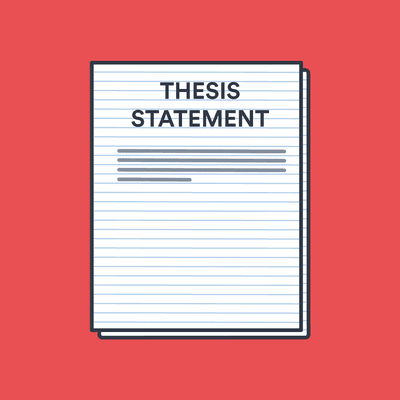
What is the proper length of a thesis statement?
Examples of thesis statements, frequently asked questions about the length of thesis statements, related articles.
If you find yourself in the process of writing a thesis statement but you don't know how long it should be, you've come to right place. In the next paragraphs you will learn about the most efficient way to write a thesis statement and how long it should be.
A thesis statement is a concise description of your work’s aim.
The short answer is: one or two sentences. The more i n-depth answer: as your writing evolves, and as you write longer papers, your thesis statement will typically be at least two, and often more, sentences. The thesis of a scholarly article may have three or four long sentences.
The point is to write a well-formed statement that clearly sets out the argument and aim of your research. A one sentence thesis is fine for shorter papers, but make sure it's a full, concrete statement. Longer thesis statements should follow the same rule; be sure that your statement includes essential information and resist too much exposition.
Here are some basic rules for thesis statement lengths based on the number of pages:
- 5 pages : 1 sentence
- 5-8 pages : 1 or 2 sentences
- 8-13 pages : 2 or 3 sentences
- 13-23 pages : 3 or 4 sentences
- Over 23 pages : a few sentences or a paragraph
Joe Haley, a former writing instructor at Johns Hopkins University exemplified in this forum post the different sizes a thesis statement can take. For a paper on Jane Austen's Pride and Prejudice, someone could come up with these two theses:
In Jane Austen's Pride and Prejudice , gossip is an important but morally ambiguous tool for shaping characters' opinions of each other.
As the aforementioned critics have noted, the prevalence of gossip in Jane Austen's oeuvre does indeed reflect the growing prominence of an explicitly-delineated private sphere in nineteenth-century British society. However, in contrast with these critics' general conclusions about Austen and class, which tend to identify her authorial voice directly with the bourgeois mores shaping her appropriation of the bildungsroman, the ambiguity of this communicative mode in Pride and Prejudice suggests that when writing at the height of her authorial powers, at least, Austen is capable of skepticism and even self-critique. For what is the narrator of her most celebrated novel if not its arch-gossip par excellence ?
Both statements are equally sound, but the second example clearly belongs in a longer paper. In the end, the length of your thesis statement will depend on the scope of your work.
There is no exact word count for a thesis statement, since the length depends on your level of knowledge and expertise. A two sentence thesis statement would be between 20-50 words.
The length of the work will determine how long your thesis statement is. A concise thesis is typically between 20-50 words. A paragraph is also acceptable for a thesis statement; however, anything over one paragraph is probably too long.
Here is a list of Thesis Statement Examples that will help you understand better how long they can be.
As a high school student, you are not expected to have an elaborate thesis statement. A couple of clear sentences indicating the aim of your essay will be more than enough.
Here is a YouTube tutorial that will help you write a thesis statement: How To Write An Essay: Thesis Statements by Ariel Bisset.


- Walden University
- Faculty Portal
Writing a Paper: Thesis Statements
Basics of thesis statements.
The thesis statement is the brief articulation of your paper's central argument and purpose. You might hear it referred to as simply a "thesis." Every scholarly paper should have a thesis statement, and strong thesis statements are concise, specific, and arguable. Concise means the thesis is short: perhaps one or two sentences for a shorter paper. Specific means the thesis deals with a narrow and focused topic, appropriate to the paper's length. Arguable means that a scholar in your field could disagree (or perhaps already has!).
Strong thesis statements address specific intellectual questions, have clear positions, and use a structure that reflects the overall structure of the paper. Read on to learn more about constructing a strong thesis statement.
Being Specific
This thesis statement has no specific argument:
Needs Improvement: In this essay, I will examine two scholarly articles to find similarities and differences.
This statement is concise, but it is neither specific nor arguable—a reader might wonder, "Which scholarly articles? What is the topic of this paper? What field is the author writing in?" Additionally, the purpose of the paper—to "examine…to find similarities and differences" is not of a scholarly level. Identifying similarities and differences is a good first step, but strong academic argument goes further, analyzing what those similarities and differences might mean or imply.
Better: In this essay, I will argue that Bowler's (2003) autocratic management style, when coupled with Smith's (2007) theory of social cognition, can reduce the expenses associated with employee turnover.
The new revision here is still concise, as well as specific and arguable. We can see that it is specific because the writer is mentioning (a) concrete ideas and (b) exact authors. We can also gather the field (business) and the topic (management and employee turnover). The statement is arguable because the student goes beyond merely comparing; he or she draws conclusions from that comparison ("can reduce the expenses associated with employee turnover").
Making a Unique Argument
This thesis draft repeats the language of the writing prompt without making a unique argument:
Needs Improvement: The purpose of this essay is to monitor, assess, and evaluate an educational program for its strengths and weaknesses. Then, I will provide suggestions for improvement.
You can see here that the student has simply stated the paper's assignment, without articulating specifically how he or she will address it. The student can correct this error simply by phrasing the thesis statement as a specific answer to the assignment prompt.
Better: Through a series of student interviews, I found that Kennedy High School's antibullying program was ineffective. In order to address issues of conflict between students, I argue that Kennedy High School should embrace policies outlined by the California Department of Education (2010).
Words like "ineffective" and "argue" show here that the student has clearly thought through the assignment and analyzed the material; he or she is putting forth a specific and debatable position. The concrete information ("student interviews," "antibullying") further prepares the reader for the body of the paper and demonstrates how the student has addressed the assignment prompt without just restating that language.
Creating a Debate
This thesis statement includes only obvious fact or plot summary instead of argument:
Needs Improvement: Leadership is an important quality in nurse educators.
A good strategy to determine if your thesis statement is too broad (and therefore, not arguable) is to ask yourself, "Would a scholar in my field disagree with this point?" Here, we can see easily that no scholar is likely to argue that leadership is an unimportant quality in nurse educators. The student needs to come up with a more arguable claim, and probably a narrower one; remember that a short paper needs a more focused topic than a dissertation.
Better: Roderick's (2009) theory of participatory leadership is particularly appropriate to nurse educators working within the emergency medicine field, where students benefit most from collegial and kinesthetic learning.
Here, the student has identified a particular type of leadership ("participatory leadership"), narrowing the topic, and has made an arguable claim (this type of leadership is "appropriate" to a specific type of nurse educator). Conceivably, a scholar in the nursing field might disagree with this approach. The student's paper can now proceed, providing specific pieces of evidence to support the arguable central claim.
Choosing the Right Words
This thesis statement uses large or scholarly-sounding words that have no real substance:
Needs Improvement: Scholars should work to seize metacognitive outcomes by harnessing discipline-based networks to empower collaborative infrastructures.
There are many words in this sentence that may be buzzwords in the student's field or key terms taken from other texts, but together they do not communicate a clear, specific meaning. Sometimes students think scholarly writing means constructing complex sentences using special language, but actually it's usually a stronger choice to write clear, simple sentences. When in doubt, remember that your ideas should be complex, not your sentence structure.
Better: Ecologists should work to educate the U.S. public on conservation methods by making use of local and national green organizations to create a widespread communication plan.
Notice in the revision that the field is now clear (ecology), and the language has been made much more field-specific ("conservation methods," "green organizations"), so the reader is able to see concretely the ideas the student is communicating.
Leaving Room for Discussion
This thesis statement is not capable of development or advancement in the paper:
Needs Improvement: There are always alternatives to illegal drug use.
This sample thesis statement makes a claim, but it is not a claim that will sustain extended discussion. This claim is the type of claim that might be appropriate for the conclusion of a paper, but in the beginning of the paper, the student is left with nowhere to go. What further points can be made? If there are "always alternatives" to the problem the student is identifying, then why bother developing a paper around that claim? Ideally, a thesis statement should be complex enough to explore over the length of the entire paper.
Better: The most effective treatment plan for methamphetamine addiction may be a combination of pharmacological and cognitive therapy, as argued by Baker (2008), Smith (2009), and Xavier (2011).
In the revised thesis, you can see the student make a specific, debatable claim that has the potential to generate several pages' worth of discussion. When drafting a thesis statement, think about the questions your thesis statement will generate: What follow-up inquiries might a reader have? In the first example, there are almost no additional questions implied, but the revised example allows for a good deal more exploration.
Thesis Mad Libs
If you are having trouble getting started, try using the models below to generate a rough model of a thesis statement! These models are intended for drafting purposes only and should not appear in your final work.
- In this essay, I argue ____, using ______ to assert _____.
- While scholars have often argued ______, I argue______, because_______.
- Through an analysis of ______, I argue ______, which is important because_______.
Words to Avoid and to Embrace
When drafting your thesis statement, avoid words like explore, investigate, learn, compile, summarize , and explain to describe the main purpose of your paper. These words imply a paper that summarizes or "reports," rather than synthesizing and analyzing.
Instead of the terms above, try words like argue, critique, question , and interrogate . These more analytical words may help you begin strongly, by articulating a specific, critical, scholarly position.
Read Kayla's blog post for tips on taking a stand in a well-crafted thesis statement.
Related Resources
Didn't find what you need? Email us at [email protected] .
- Previous Page: Introductions
- Next Page: Conclusions
- Office of Student Disability Services
Walden Resources
Departments.
- Academic Residencies
- Academic Skills
- Career Planning and Development
- Customer Care Team
- Field Experience
- Military Services
- Student Success Advising
- Writing Skills
Centers and Offices
- Center for Social Change
- Office of Academic Support and Instructional Services
- Office of Degree Acceleration
- Office of Research and Doctoral Services
- Office of Student Affairs
Student Resources
- Doctoral Writing Assessment
- Form & Style Review
- Quick Answers
- ScholarWorks
- SKIL Courses and Workshops
- Walden Bookstore
- Walden Catalog & Student Handbook
- Student Safety/Title IX
- Legal & Consumer Information
- Website Terms and Conditions
- Cookie Policy
- Accessibility
- Accreditation
- State Authorization
- Net Price Calculator
- Contact Walden
Walden University is a member of Adtalem Global Education, Inc. www.adtalem.com Walden University is certified to operate by SCHEV © 2024 Walden University LLC. All rights reserved.
Think of yourself as a member of a jury, listening to a lawyer who is presenting an opening argument. You'll want to know very soon whether the lawyer believes the accused to be guilty or not guilty, and how the lawyer plans to convince you. Readers of academic essays are like jury members: before they have read too far, they want to know what the essay argues as well as how the writer plans to make the argument. After reading your thesis statement, the reader should think, "This essay is going to try to convince me of something. I'm not convinced yet, but I'm interested to see how I might be."
An effective thesis cannot be answered with a simple "yes" or "no." A thesis is not a topic; nor is it a fact; nor is it an opinion. "Reasons for the fall of communism" is a topic. "Communism collapsed in Eastern Europe" is a fact known by educated people. "The fall of communism is the best thing that ever happened in Europe" is an opinion. (Superlatives like "the best" almost always lead to trouble. It's impossible to weigh every "thing" that ever happened in Europe. And what about the fall of Hitler? Couldn't that be "the best thing"?)
A good thesis has two parts. It should tell what you plan to argue, and it should "telegraph" how you plan to argue—that is, what particular support for your claim is going where in your essay.
Steps in Constructing a Thesis
First, analyze your primary sources. Look for tension, interest, ambiguity, controversy, and/or complication. Does the author contradict himself or herself? Is a point made and later reversed? What are the deeper implications of the author's argument? Figuring out the why to one or more of these questions, or to related questions, will put you on the path to developing a working thesis. (Without the why, you probably have only come up with an observation—that there are, for instance, many different metaphors in such-and-such a poem—which is not a thesis.)
Once you have a working thesis, write it down. There is nothing as frustrating as hitting on a great idea for a thesis, then forgetting it when you lose concentration. And by writing down your thesis you will be forced to think of it clearly, logically, and concisely. You probably will not be able to write out a final-draft version of your thesis the first time you try, but you'll get yourself on the right track by writing down what you have.
Keep your thesis prominent in your introduction. A good, standard place for your thesis statement is at the end of an introductory paragraph, especially in shorter (5-15 page) essays. Readers are used to finding theses there, so they automatically pay more attention when they read the last sentence of your introduction. Although this is not required in all academic essays, it is a good rule of thumb.
Anticipate the counterarguments. Once you have a working thesis, you should think about what might be said against it. This will help you to refine your thesis, and it will also make you think of the arguments that you'll need to refute later on in your essay. (Every argument has a counterargument. If yours doesn't, then it's not an argument—it may be a fact, or an opinion, but it is not an argument.)
This statement is on its way to being a thesis. However, it is too easy to imagine possible counterarguments. For example, a political observer might believe that Dukakis lost because he suffered from a "soft-on-crime" image. If you complicate your thesis by anticipating the counterargument, you'll strengthen your argument, as shown in the sentence below.
Some Caveats and Some Examples
A thesis is never a question. Readers of academic essays expect to have questions discussed, explored, or even answered. A question ("Why did communism collapse in Eastern Europe?") is not an argument, and without an argument, a thesis is dead in the water.
A thesis is never a list. "For political, economic, social and cultural reasons, communism collapsed in Eastern Europe" does a good job of "telegraphing" the reader what to expect in the essay—a section about political reasons, a section about economic reasons, a section about social reasons, and a section about cultural reasons. However, political, economic, social and cultural reasons are pretty much the only possible reasons why communism could collapse. This sentence lacks tension and doesn't advance an argument. Everyone knows that politics, economics, and culture are important.
A thesis should never be vague, combative or confrontational. An ineffective thesis would be, "Communism collapsed in Eastern Europe because communism is evil." This is hard to argue (evil from whose perspective? what does evil mean?) and it is likely to mark you as moralistic and judgmental rather than rational and thorough. It also may spark a defensive reaction from readers sympathetic to communism. If readers strongly disagree with you right off the bat, they may stop reading.
An effective thesis has a definable, arguable claim. "While cultural forces contributed to the collapse of communism in Eastern Europe, the disintegration of economies played the key role in driving its decline" is an effective thesis sentence that "telegraphs," so that the reader expects the essay to have a section about cultural forces and another about the disintegration of economies. This thesis makes a definite, arguable claim: that the disintegration of economies played a more important role than cultural forces in defeating communism in Eastern Europe. The reader would react to this statement by thinking, "Perhaps what the author says is true, but I am not convinced. I want to read further to see how the author argues this claim."
A thesis should be as clear and specific as possible. Avoid overused, general terms and abstractions. For example, "Communism collapsed in Eastern Europe because of the ruling elite's inability to address the economic concerns of the people" is more powerful than "Communism collapsed due to societal discontent."
Copyright 1999, Maxine Rodburg and The Tutors of the Writing Center at Harvard University
Home / Guides / Writing Guides / Parts of a Paper / How to Write a Strong Thesis Statement
How to Write a Strong Thesis Statement
A thesis can be found in many places—a debate speech, a lawyer’s closing argument, even an advertisement. But the most common place for a thesis statement (and probably why you’re reading this article) is in an essay.
Whether you’re writing an argumentative paper, an informative essay, or a compare/contrast statement, you need a thesis. Without a thesis, your argument falls flat and your information is unfocused. Since a thesis is so important, it’s probably a good idea to look at some tips on how to put together a strong one.
Guide Overview
What is a “thesis statement” anyway.
- 2 categories of thesis statements: informative and persuasive
- 2 styles of thesis statements
- Formula for a strong argumentative thesis
- The qualities of a solid thesis statement (video)
You may have heard of something called a “thesis.” It’s what seniors commonly refer to as their final paper before graduation. That’s not what we’re talking about here. That type of thesis is a long, well-written paper that takes years to piece together.
Instead, we’re talking about a single sentence that ties together the main idea of any argument . In the context of student essays, it’s a statement that summarizes your topic and declares your position on it. This sentence can tell a reader whether your essay is something they want to read.
2 Categories of Thesis Statements: Informative and Persuasive
Just as there are different types of essays, there are different types of thesis statements. The thesis should match the essay.
For example, with an informative essay, you should compose an informative thesis (rather than argumentative). You want to declare your intentions in this essay and guide the reader to the conclusion that you reach.
To make a peanut butter and jelly sandwich, you must procure the ingredients, find a knife, and spread the condiments.
This thesis showed the reader the topic (a type of sandwich) and the direction the essay will take (describing how the sandwich is made).
Most other types of essays, whether compare/contrast, argumentative, or narrative, have thesis statements that take a position and argue it. In other words, unless your purpose is simply to inform, your thesis is considered persuasive. A persuasive thesis usually contains an opinion and the reason why your opinion is true.
Peanut butter and jelly sandwiches are the best type of sandwich because they are versatile, easy to make, and taste good.
In this persuasive thesis statement, you see that I state my opinion (the best type of sandwich), which means I have chosen a stance. Next, I explain that my opinion is correct with several key reasons. This persuasive type of thesis can be used in any essay that contains the writer’s opinion, including, as I mentioned above, compare/contrast essays, narrative essays, and so on.
2 Styles of Thesis Statements
Just as there are two different types of thesis statements (informative and persuasive), there are two basic styles you can use.
The first style uses a list of two or more points . This style of thesis is perfect for a brief essay that contains only two or three body paragraphs. This basic five-paragraph essay is typical of middle and high school assignments.
C.S. Lewis’s Chronicles of Narnia series is one of the richest works of the 20th century because it offers an escape from reality, teaches readers to have faith even when they don’t understand, and contains a host of vibrant characters.
In the above persuasive thesis, you can see my opinion about Narnia followed by three clear reasons. This thesis is perfect for setting up a tidy five-paragraph essay.
In college, five paragraph essays become few and far between as essay length gets longer. Can you imagine having only five paragraphs in a six-page paper? For a longer essay, you need a thesis statement that is more versatile. Instead of listing two or three distinct points, a thesis can list one overarching point that all body paragraphs tie into.
Good vs. evil is the main theme of Lewis’s Narnia series, as is made clear through the struggles the main characters face in each book.
In this thesis, I have made a claim about the theme in Narnia followed by my reasoning. The broader scope of this thesis allows me to write about each of the series’ seven novels. I am no longer limited in how many body paragraphs I can logically use.
Formula for a Strong Argumentative Thesis
One thing I find that is helpful for students is having a clear template. While students rarely end up with a thesis that follows this exact wording, the following template creates a good starting point:
___________ is true because of ___________, ___________, and ___________.
Conversely, the formula for a thesis with only one point might follow this template:
___________________ is true because of _____________________.
Students usually end up using different terminology than simply “because,” but having a template is always helpful to get the creative juices flowing.
The Qualities of a Solid Thesis Statement
When composing a thesis, you must consider not only the format, but other qualities like length, position in the essay, and how strong the argument is.
Length: A thesis statement can be short or long, depending on how many points it mentions. Typically, however, it is only one concise sentence. It does contain at least two clauses, usually an independent clause (the opinion) and a dependent clause (the reasons). You probably should aim for a single sentence that is at least two lines, or about 30 to 40 words long.
Position: A thesis statement always belongs at the beginning of an essay. This is because it is a sentence that tells the reader what the writer is going to discuss. Teachers will have different preferences for the precise location of the thesis, but a good rule of thumb is in the introduction paragraph, within the last two or three sentences.
Strength: Finally, for a persuasive thesis to be strong, it needs to be arguable. This means that the statement is not obvious, and it is not something that everyone agrees is true.
Example of weak thesis:
Peanut butter and jelly sandwiches are easy to make because it just takes three ingredients.
Most people would agree that PB&J is one of the easiest sandwiches in the American lunch repertoire.
Example of a stronger thesis:
Peanut butter and jelly sandwiches are fun to eat because they always slide around.
This is more arguable because there are plenty of folks who might think a PB&J is messy or slimy rather than fun.
Composing a thesis statement does take a bit more thought than many other parts of an essay. However, because a thesis statement can contain an entire argument in just a few words, it is worth taking the extra time to compose this sentence. It can direct your research and your argument so that your essay is tight, focused, and makes readers think.
EasyBib Writing Resources
Writing a paper.
- Academic Essay
- Argumentative Essay
- College Admissions Essay
- Expository Essay
- Persuasive Essay
- Research Paper
- Thesis Statement
- Writing a Conclusion
- Writing an Introduction
- Writing an Outline
- Writing a Summary
EasyBib Plus Features
- Citation Generator
- Essay Checker
- Expert Check Proofreader
- Grammar Checker
- Paraphrasing Tools
Plagiarism Checker
- Spell Checker
How useful was this post?
Click on a star to rate it!
We are sorry that this post was not useful for you!
Let us improve this post!
Tell us how we can improve this post?
Grammar and Plagiarism Checkers
Grammar Basics
Plagiarism Basics
Writing Basics
Upload a paper to check for plagiarism against billions of sources and get advanced writing suggestions for clarity and style.
Get Started
How Long Should a Thesis Statement Be?
.png)
Mark Bradford
Writing a thesis statement is like charting a roadmap for your readers in your academic work. But there's this persistent question: How long should it be? We often hear "short and sweet," but the real answer isn't just about counting words. It's about finding the right balance between being concise and giving enough detail. In this article, we'll explore how to strike that balance and craft a thesis statement that's clear, engaging, and just the right length.
Perfect Thesis Statement Length
A thesis statement is the backbone of any academic paper, concisely declaring the central argument or main idea that the writer aims to convey. Typically found at the end of the introductory paragraph, it sets the tone for the entire writing by outlining the key points or claims that will be explored and supported throughout the paper. Please consider these tips on how to write a thesis statement in our separate guide.
.png)
The ideal length for a thesis statement typically ranges from one to two sentences, comprising around 20 to 30 words. This concise yet comprehensive structure allows for the clear articulation of the main argument or point of the paper, guiding readers without overwhelming them with unnecessary detail.
A succinct thesis statement ensures that the core message of the paper is effectively communicated while maintaining focus and clarity. However, the length can vary depending on the complexity of the topic and the depth of the argument being presented. Ultimately, the perfect thesis statement length strikes a balance between brevity and informativeness, providing a solid foundation for the subsequent discussion in the paper. If you find it challenging to create a concise and impactful thesis statement, consider reaching out to do my essay services for assistance. These services offer tailored guidance and support to ensure that your thesis statement accurately reflects the essence of your paper.
For shorter academic papers, such as essays or short research papers (3-5 pages), a thesis statement should typically be concise, comprising one or two sentences totaling around 20 to 30 words. For longer papers, such as a bachelor's or master's thesis (50-100 pages), the thesis statement may be more expansive, spanning one or two paragraphs, but it should still aim to be clear and focused. Here is a general rule of thumb for determining the length of a thesis statement lengths based on the number of pages in the paper:
- 5 pages: 1 sentence.
- 5-8 pages: 1 or 2 sentences.
- 8-13 pages: 2 or 3 sentences.
- 13-23 pages: 3 or 4 sentences.
- Over 23 pages: a few sentences or a paragraph.
Use such an academic tool as a thesis statement generator to produce a hypothesis or the main argument of your paper with a perfect length.

Thesis Statements Examples
Considered these three thesis statements based on "To Kill a Mockingbird" by Harper Lee.
Short thesis statement example:
In "To Kill a Mockingbird," Harper Lee explores themes of racial injustice and moral growth through the experiences of Scout Finch, highlighting the impact of prejudice on society.
Medium thesis statement example:
Harper Lee's "To Kill a Mockingbird" delves into the complexities of race, class, and morality in the 1930s American South, as seen through the eyes of Scout Finch. Through the trial of Tom Robinson and the moral guidance of her father, Atticus Finch, Scout learns valuable lessons about empathy, justice, and the inherent dignity of all individuals.
Long thesis statement example:
Through the character of Scout Finch and the setting of 1930s Alabama, Harper Lee's "To Kill a Mockingbird" masterfully navigates the intricacies of societal prejudice and moral growth. As Scout confronts the harsh realities of racial injustice during her father's defense of Tom Robinson, she grapples with questions of empathy, integrity, and the complexities of human nature. Lee's exploration of these themes sheds light on the historical context of the Jim Crow era and resonates deeply with contemporary discussions on racism, empathy, and the pursuit of justice.

How Long Should the Thesis Statement of a High School Essay Be?
How long is too long for a thesis statement, what is the word count of a thesis statement.
Mark Bradford , a passionate and talented artist, utilizes his innovative spirit to support academic pursuits. In partnering with EssayHub, he leverages his artistic insights to assist students as a professional essay writer, helping them navigate and complete their academic assignments at every level of difficulty.

- Plagiarism Report
- Unlimited Revisions
- 24/7 Support
Purdue Online Writing Lab Purdue OWL® College of Liberal Arts
Tips and Examples for Writing Thesis Statements

Welcome to the Purdue OWL
This page is brought to you by the OWL at Purdue University. When printing this page, you must include the entire legal notice.
Copyright ©1995-2018 by The Writing Lab & The OWL at Purdue and Purdue University. All rights reserved. This material may not be published, reproduced, broadcast, rewritten, or redistributed without permission. Use of this site constitutes acceptance of our terms and conditions of fair use.
Tips for Writing Your Thesis Statement
1. Determine what kind of paper you are writing:
- An analytical paper breaks down an issue or an idea into its component parts, evaluates the issue or idea, and presents this breakdown and evaluation to the audience.
- An expository (explanatory) paper explains something to the audience.
- An argumentative paper makes a claim about a topic and justifies this claim with specific evidence. The claim could be an opinion, a policy proposal, an evaluation, a cause-and-effect statement, or an interpretation. The goal of the argumentative paper is to convince the audience that the claim is true based on the evidence provided.
If you are writing a text that does not fall under these three categories (e.g., a narrative), a thesis statement somewhere in the first paragraph could still be helpful to your reader.
2. Your thesis statement should be specific—it should cover only what you will discuss in your paper and should be supported with specific evidence.
3. The thesis statement usually appears at the end of the first paragraph of a paper.
4. Your topic may change as you write, so you may need to revise your thesis statement to reflect exactly what you have discussed in the paper.
Thesis Statement Examples
Example of an analytical thesis statement:
The paper that follows should:
- Explain the analysis of the college admission process
- Explain the challenge facing admissions counselors
Example of an expository (explanatory) thesis statement:
- Explain how students spend their time studying, attending class, and socializing with peers
Example of an argumentative thesis statement:
- Present an argument and give evidence to support the claim that students should pursue community projects before entering college
- Thesis Action Plan New
- Academic Project Planner
- Literature Navigator
- Thesis Dialogue Blueprint
- Writing Wizard's Template
- Research Proposal Compass
- Why students love us
- Why professors love us
- Why we are different
- All Products
- Coming Soon

Formulating Effective Example Research Questions for a Comprehensive Literature Review

Overcoming Anxiety to Write Your Thesis: Tips and Strategies

Crafting the Perfect Example of Introduction in a Research Paper

Conquering Anxiety to Write Your PhD Thesis: A Comprehensive Guide
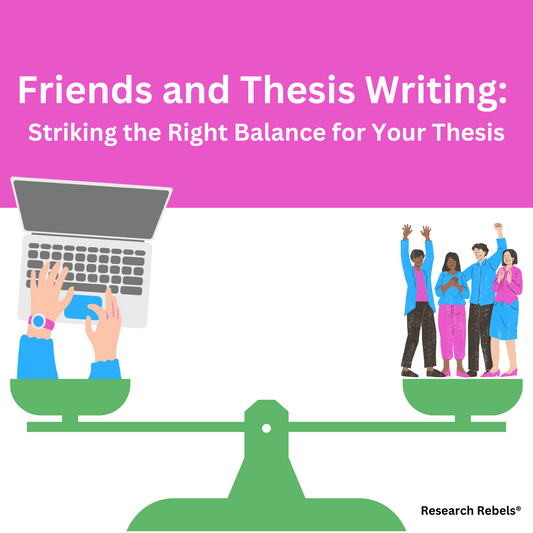
Friends and Thesis Writing: Striking the Right Balance for Your Thesis

Mastering the Art of Communication: Effective Strategies for Voice Your Research in Interviews
Navigating ethical dilemmas: the morality of conducting interviews.
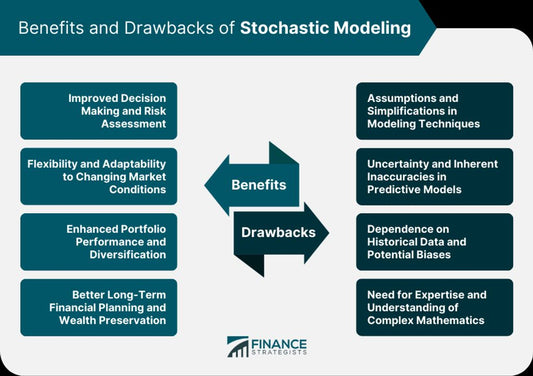
Data Anomalies: Strategies for Analyzing and Interpreting Outlier Data
The ideal length: unpacking how long your thesis statement should be.

In the academic realm, the thesis statement is the cornerstone of a strong essay or research paper. It serves as a compact reflection of the argument or analysis that follows, guiding both the writer and the reader through the text. Crafting the ideal thesis statement involves striking a balance between brevity and comprehensiveness, ensuring that it is concise yet encapsulates the essence of the research. This article delves into the nuances of thesis statement length and offers practical advice for developing a clear and effective thesis.
Key Takeaways
- A thesis statement should be concise, typically one sentence, and clearly present the main argument or claim of the paper.
- Effective thesis statements are specific and narrow the topic, providing a roadmap for the content that follows.
- The ideal length of a thesis statement balances brevity with the need to be comprehensive enough to guide the research.
- Structural techniques, such as the three-prong approach, can help in constructing a coherent and logically flowing thesis statement.
- The complexity and academic level of the paper may influence the length and depth of the thesis statement.
Defining the Thesis Statement: Scope and Function
The core purpose of a thesis statement.
At the heart of your academic writing lies the thesis statement , a pivotal element that articulates the central argument of your work. A thesis statement guides the reader by presenting the main argument and providing focus and direction. It is not merely a statement of fact, but rather a claim that requires evidence and rationale. The purpose of a thesis statement is to inform the reader of the topic to be discussed and to present the writer's stance or argument on that topic.
An effective thesis statement is succinct yet comprehensive, encapsulating the essence of your research in a single sentence. It should be specific enough to give a clear indication of your research scope, yet broad enough to encompass the various aspects that you will address. Here's a simple breakdown of what a thesis statement should include:
- Topic: The subject matter of your research.
- Claim: Your assertion or main argument about the topic.
- Supporting evidence: The key points that back up your claim.
Remember, the clarity and precision of your thesis statement will set the tone for the entire paper, guiding your research and writing efforts towards a coherent and impactful conclusion.
Characteristics of an Effective Thesis
An effective thesis statement is the backbone of a well-structured paper. It serves as a roadmap for your readers, guiding them through the arguments and evidence that you will present. Your thesis should make a clear assertion , reflecting your position on the topic. It's not merely a statement of fact, but a claim that requires evidence and reasoning to support it.
To ensure that your thesis is both manageable and significant, it should be narrow enough to be covered in the scope of your paper, yet broad enough to allow for a comprehensive discussion. Here are some key characteristics to aim for:
- Arguable : Your thesis should present a point that could be challenged or opposed by others.
- Specific : Avoid vague language by being as precise as possible about what you will discuss.
- Focused : Stay on topic and ensure that all parts of your thesis are relevant to the main argument.
Remember, the strength of your thesis is not just in its length, but in its ability to convey complex ideas succinctly and persuasively. As you engage in thesis writing , consider the challenges such as time management and staying motivated. Utilize tools for academic planning and ensure your research proposal adheres to ethical standards. By balancing these elements, you will craft a thesis that not only stands out but also provides a clear direction for your research.

The Role of a Thesis Statement in Guiding Research
A thesis statement serves as a compass for your research journey, providing direction and boundaries for your scholarly exploration. It is the assertion of your study, the claim you set out to prove, and it should be crafted with precision to guide your research effectively. Your thesis statement is the anchor of your entire paper , ensuring that all subsequent research aligns with your central argument.
When you begin to how to find research question , the thesis statement becomes a critical tool. It narrows down the scope of your inquiry and sets clear objectives , which are essential for focused research. A well-defined thesis statement delineates the boundaries of your study, preventing you from veering off into unrelated territories. Consider the following points to ensure your thesis statement fulfills its role in guiding your research:
- It should clearly state the purpose of your research.
- It must be specific enough to provide a clear direction.
- It should be broad enough to allow for comprehensive exploration within the set boundaries.
By adhering to these guidelines, you can ensure that your thesis statement acts as a reliable guide throughout your research process, leading to a coherent and impactful scholarly work.
Crafting the Ideal Thesis Statement: Length and Clarity
Balancing brevity with comprehensiveness.
Striking the right balance between brevity and comprehensiveness in your thesis statement is crucial. Your thesis should be succinct yet sufficiently detailed to guide your research and inform your readers of the scope and direction of your paper. It's a delicate dance between being concise and including enough information to be clear and informative.
To achieve this balance, start by drafting a statement that encapsulates the main point of your research. Then, critically evaluate each word for its contribution to your statement's clarity and purpose. Precision is key; every term should add value and meaning. For instance, rather than saying 'various factors affect climate change,' specify which key factors you will explore.
Consider the following list to refine your thesis statement:
- Identify the core message of your research.
- Eliminate redundant or non-essential words.
- Ensure technical terms are necessary and well-defined.
- Revise for clarity and brevity , as suggested by the snippet: 'Refine your thesis to make it as clear and concise as possible.'
Remember, a well-balanced thesis statement serves as a beacon for your entire research project , providing a clear path for you and your readers to follow.
Achieving Precision in Your Thesis Statement
To achieve precision in your thesis statement, you must distill your argument to its essence. A precise thesis statement clearly expresses your position on the topic, whether you are supporting, refuting, or analyzing an idea. It is the compass that guides your research and writing, ensuring that every element of your paper aligns with your central claim. Avoid vague language and be as specific as possible without delving into the details reserved for the body of your work.
Consider the following steps to refine your thesis statement:
- Identify the core message you wish to convey.
- Eliminate any superfluous information that does not directly support your main point .
- Use active verbs and assertive language to articulate your stance.
- Test the specificity of your thesis by checking if it clearly outlines the scope of your paper.
Remember, a well-crafted thesis statement not only provides clarity on the subject but also makes the main point of your paper more impactful. By maintaining a formal and unbiased tone, you avoid emotional language that could detract from the academic rigor of your thesis.
The Impact of Thesis Length on Reader Comprehension
The length of your thesis statement can significantly influence reader comprehension. A statement that is too brief may fail to provide enough information, leaving readers with questions about your argument's scope and direction. Conversely, an overly long thesis can overwhelm readers with details, obscuring the main point. Striking a balance is key ; your thesis should be concise enough to maintain reader engagement while providing sufficient insight into your research focus.
To achieve this balance, consider the following points:
- Ensure your thesis is directly related to the research question .
- Include only the most pertinent information that supports your argument.
- Avoid unnecessary jargon or complex language that may confuse readers.
Remember, the goal is to guide your readers through your argument with clarity and precision. Websites that offer tools for thesis writing emphasize the importance of a clear thesis in academic research. They provide resources such as worksheets and guides to help you refine your thesis statement, ensuring it serves its purpose effectively.
Structural Elements of a Thesis Statement
The three-prong approach to thesis construction.
When you embark on the journey of crafting your thesis statement, the three-prong approach offers a structured method to ensure clarity and direction. This technique involves stating your main claim and outlining three supporting points that bolster your argument. Your thesis becomes a roadmap , guiding both your writing process and your reader's understanding.
To construct a three-prong thesis, start with your central claim, then identify three key points that substantiate this claim. These points should be ordered logically, as they will correspond to the structure of your essay. Here's a simple breakdown:
- State your main claim (what you are trying to prove).
- Outline your first supporting point.
- Detail your second supporting point.
- Conclude with your third supporting point.
Remember, each supporting point will be explored in depth within the body of your work, so choose them wisely. By adhering to this approach, you create a thesis that not only presents your argument but also organizes the content to follow, making your writing more effective and comprehensible.
Utilizing Connecting Words for Coherence
To achieve coherence in your thesis statement, it is essential to use connecting words effectively. These linguistic tools serve as bridges between your claim and the supporting points, ensuring a smooth transition that guides the reader through your argument. Consider starting with an attention-grabbing sentence, perhaps using a surprising statistic or an intriguing example, to captivate your audience from the outset.
By employing connecting words such as 'because', 'due to', and 'as a result of', you create a logical structure that enhances the flow of your thesis statement. This technique not only clarifies the relationship between different components of your argument but also reinforces the central message of your research. Below is a list of connecting words that can be strategically placed to maintain coherence:
- as a result of
- demonstrated by
- in order to
Remember to repeat key terms throughout your essay, especially in the thesis and at the beginning of paragraphs, to remind readers of your core message and maintain lexical coherence.
Ordering Supporting Points for Logical Flow
When you construct your thesis statement, the ordering of your supporting points is crucial for establishing a clear and logical flow. Start by identifying all key points in your argument and then organize them in a manner that guides the reader through your reasoning. Typically, this order mirrors the structure of your essay: an introduction of the main argument, followed by the supporting points, and culminating in a strong conclusion.
Each supporting point should be linked to the next with the use of connecting words, ensuring coherence throughout your thesis. This not only strengthens the readability of your thesis but also provides a roadmap for your research, allowing you to analyze your data with precision. Consider the following list of connecting words to enhance the flow between points:
By meticulously structuring your thesis statement in this way, you set the stage for a compelling and persuasive essay that is easy for your readers to follow.
Practical Techniques for Thesis Development
Employing the three-prong formula.
When you embark on the journey of crafting your thesis statement, the three-prong formula offers a structured approach to ensure clarity and direction. Your thesis statement should encapsulate your main argument plus three supporting points , providing a clear roadmap for your essay. This formula not only asserts your central claim but also organizes the subsequent analysis into manageable segments.
To effectively employ this method, begin by identifying your primary conclusion. Then, determine the main issues you will analyze, which will serve as the supporting points. For instance, if your thesis is about the best film adaptations, your supporting points might explore critical response, box office success, and industry impact. Here's a simple breakdown:
- Main conclusion: The central argument or stance you are taking.
- Supporting point 1: The first aspect you will discuss in your essay.
- Supporting point 2: The second aspect, following the logical sequence.
- Supporting point 3: The final aspect, rounding out your argument.
As you develop your thesis, remember to consult various resources to strengthen your points. Utilizing how to find literature guides can be instrumental in gathering relevant information to back your claims. Websites offering thesis resources and academic tools can provide additional support, featuring worksheets, testimonials, and research guidance to aid in your thesis success.
Refining Your Thesis Through Revision
Revision is a critical step in honing your thesis statement to perfection. Initially, your thesis may start as a broad declaration of your study's intent. However, through revision, you can transform it into a sharp, focused argument that clearly conveys your position. An effective thesis should be argumentative and controversial , meaning it should invite plausible counterarguments, which in turn strengthens the discourse around your research.
When refining your thesis, consider its scope. If you're struggling to find sufficient information, your topic might be too narrow. Broaden it by exploring related issues or employing comparative analyses. Conversely, a thesis that is too broad may lack depth and specificity. Narrow it down by focusing on particular aspects or perspectives of your topic. This process of adjustment ensures that your thesis is neither too broad nor too narrow, but just right.
Here are some steps to guide you in the revision process:
- Evaluate the specificity of your thesis: Is it too vague or overly general?
- Ensure that your thesis makes an assertive claim and invites discussion.
- Check the logical flow of your supporting points; they should build upon each other coherently.
- Seek feedback from peers or mentors to gain different perspectives on your thesis's clarity and argumentative strength.
Remember, refining your thesis is an iterative process. It may require multiple drafts before you arrive at the ideal statement that encapsulates the essence of your research with precision and clarity.
Examples and Templates for Thesis Statements
As you embark on the journey of crafting your thesis statement, it's helpful to have concrete examples and templates at your disposal. These serve as guides to shape your own scholarly assertions, ensuring they are both robust and succinct. Sample thesis statements can illuminate the path from a broad topic to a focused argument, demonstrating how to encapsulate complex ideas into a single, compelling sentence.
To illustrate, consider the following template: "Despite [evidence that suggests otherwise], [aspect A] is [significant/important] because [reason 1], [reason 2], and [reason 3]." This structure aids in achieving clarity and precision, while also providing a logical flow for your argument. The use of connecting words such as 'despite' and 'because' adds coherence, guiding the reader through your line of reasoning.
In addition to templates, online resources like the Purdue University Online Writing Lab offer invaluable tips and further examples for writing thesis statements. Universities often provide structured formats to help you develop a thesis that stands firm on its scholarly merits. By utilizing these resources, you can refine your thesis to effectively map out the content of your research, making it a powerful anchor for your academic work.
Advanced Considerations for Thesis Statements
Adapting thesis length to academic levels.
As you progress through your academic career, the expectations for your thesis statement—and indeed, the thesis itself—will evolve. At the undergraduate level, a thesis statement may be a concise sentence that clearly states the argument or premise of your paper. However, as you move into graduate studies, the complexity of your research will likely increase, necessitating a more detailed thesis statement that can span several sentences or even a full paragraph.
The length of your thesis statement should be commensurate with the depth of your research and the academic rigor of your program. For instance, a master's thesis may require a more nuanced thesis statement that addresses multiple facets of the research question, while a doctoral dissertation could demand an even more comprehensive and intricate statement to encapsulate the breadth of the inquiry.
To illustrate, consider the following academic levels and their corresponding thesis statement lengths:
- Undergraduate: 1-2 sentences
- Master's: 2-3 sentences
- Doctoral: A full paragraph or more
Remember, the goal is to convey your research's scope and significance without sacrificing clarity for brevity. Striking this balance is key to crafting an effective thesis statement that resonates with your audience and provides a clear roadmap for your research.
Navigating Complex Arguments in Thesis Statements
When you're tasked with crafting a thesis statement that encapsulates complex arguments, it's natural to feel a surge of thesis anxiety . However, the key to navigating this challenge lies in structuring your statement to convey intricate ideas with clarity and precision. Start by breaking down your argument into its core components ; this will help you to maintain focus and avoid becoming overwhelmed.
To ensure that your thesis remains coherent despite its complexity, consider the following points:
- Identify the main claim and its significance.
- Outline the supporting arguments or evidence.
- Clarify the relationships between the different parts of the argument.
By methodically organizing your thoughts and articulating the connections between them, you can create a thesis statement that is both comprehensive and comprehensible. Websites that offer tools for thesis writing, such as worksheets, templates, and guides , can be invaluable in this process. They provide structured support to help you refine your thesis, ensuring that your complex arguments are presented in a way that is accessible to your readers.
The Evolution of Thesis Statements in Scholarly Writing
As you delve into the realm of scholarly writing, you'll notice that thesis statements have undergone a significant transformation over time. Initially, theses were often straightforward assertions , but as academic discourse has evolved, so has the complexity of thesis statements. They now encapsulate not only the central argument but also the nuances and subtleties of the writer's stance.
In contemporary scholarship, a thesis statement is expected to be a dynamic entity, adapting to the depth and breadth of the research it represents. It's not uncommon for a thesis to be a multi-sentence construct, especially in works that tackle intricate subjects or extensive research projects. The key is to maintain clarity and direction, regardless of length , ensuring that your thesis acts as a reliable compass for your readers.
To illustrate this evolution, consider the following points:
- Thesis statements have transitioned from simple claims to complex, argumentative constructs.
- The expectation for precision and specificity in a thesis has increased.
- Academic disciplines now often dictate the form and function of a thesis, with variations across fields.
Embrace this progression by crafting a thesis that is not only informative but also reflective of the scholarly maturity expected in your field of study.
Delving into the realm of thesis writing can be daunting, but with the right guidance, it becomes an enlightening journey. Our 'Advanced Considerations for Thesis Statements' section is designed to equip you with the nuanced understanding necessary to craft compelling and sophisticated thesis statements. Don't let anxiety and uncertainty hinder your academic progress. Visit our website now to explore our comprehensive Thesis Action Plan and take the first step towards thesis mastery. Transform your sleepless nights into a celebration of knowledge with Research Rebels.
In conclusion, the ideal length of a thesis statement is a nuanced matter, contingent upon the scope and complexity of the research topic. While brevity is essential, with high school essays typically requiring a single sentence, more extensive research endeavors may necessitate a longer, multi-sentence thesis. The thesis statement must be concise yet comprehensive, providing a clear claim and a roadmap for the essay. It should not merely announce the topic but take a definitive stand, guiding the reader through the argument with a logical sequence of supporting points. Ultimately, the thesis statement is the anchor of the essay, and its precision and clarity are paramount to effectively communicating the essence of the research and the writer's stance.
Frequently Asked Questions
What is a thesis statement and why is it important.
A thesis statement is a concise summary of the main point or claim of an essay or research paper. It is important because it guides the direction of your research and outlines the scope of the essay for the reader.
How long should a thesis statement be?
A thesis statement should be concise and usually one sentence long. It should be long enough to cover the main points but short enough to remain clear and focused.
Can a thesis statement be more than one sentence?
Typically, a thesis statement should be one sentence. However, for complex papers or detailed arguments, it may extend to two sentences to include all relevant points.
What is the three-prong approach to thesis construction?
The three-prong approach is a method of structuring a thesis statement by presenting three supporting points that outline the main arguments of the paper.
How does the length of a thesis statement affect reader comprehension?
The length of a thesis statement can impact reader comprehension by providing clarity and focus. Too long and it may confuse the reader; too short and it may not convey enough information.
Should the complexity of a thesis statement vary with academic levels?
Yes, the complexity of a thesis statement may increase with higher academic levels to reflect the depth of analysis and research required for advanced scholarly writing.

- Rebels Blog
- Blog Articles
- Terms and Conditions
- Payment and Shipping Terms
- Privacy Policy
- Return Policy
© 2024 Research Rebels, All rights reserved.
Your cart is currently empty.
What are the six different essay lengths?

This is the second of three chapters about Essays . To complete this reader, read each chapter carefully and then unlock and complete our materials to check your understanding.
– Discuss why essays might vary in length
– Outline the six major lengths of academic essay
– Provide defining features for each essay length
Chapter 1: What is an academic essay?
Chapter 2: What are the six different essay lengths?
Chapter 3: What are the seven different types of academic essay?
Before you begin reading...
- video and audio texts
- knowledge checks and quizzes
- skills practices, tasks and assignments
The length of essay you’re assigned will likely depend on where you are exactly in your academic course. Generally, assignments at the start of a bachelor’s degree will be shorter than those required in a student’s final years, just like master’s and doctoral-level essays will continue to increase in both length and difficulty.
1. The One-Paragraph Essay
Generally about 150 to 250 words in length, the one-paragraph essay may be assigned by academic tutors simply in order to practise the basic concepts of paragraph writing, or it may also be used for specific purposes such as to practise summarising an article that’s been read in class or to write an extended definition of a concept. Additionally, one-paragraph essays may also be used as a diagnostic to quickly determine the level of a student’s writing. Unlike other essay lengths, for the one-paragraph essay, you’ll need to include at least some introductory, body and conclusive elements within the same paragraph.
2. The Three-Paragraph Essay
Usually around 500 words in length, the three-paragraph essay is generally used to introduce students to the concept that all essays should maintain an introduction , body section and conclusion if the writer wishes to produce cohesive and a logical writing. The introduction and conclusion will be the first and last paragraphs and tend to be a little shorter in length, while the central body paragraph will contain the essay’s content or argument. A simple table explaining the balance of content in a three-paragraph essay has been provided below:
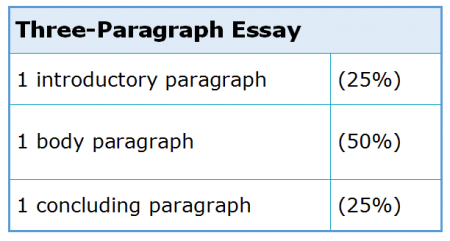
3. The Five-Paragraph Essay
Around 1,000 words in length, the five-paragraph essay is generally set by tutors who are content that their students understand the introduction-body-conclusion essay structure and wish to allow more freedom to expand the ideas and arguments presented by the writer in the body section of the essay. This length of essay still only dedicates one paragraph to the introduction and conclusion , but allows three paragraphs to be dedicated to the exploration of the theme in the essay’s body. At this length, certain essay types such as cause and effect essays or compare and contrast essays may now be utilised. The following is a simple diagram of the balance of paragraph lengths in a five-paragraph essay.
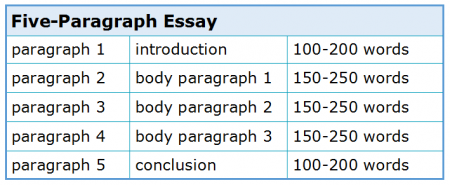
4. The Extended Essay
The extended essay is the most common type of essay that’s assigned during a bachelor’s or master’s degree , and it may be of any length – although it’s unusual for such essays to be above 5,000 words. The most common lengths for an extended essay are 1,500, 3,000 and 5,000 words, with a word count allowance of plus or minus 10%. Such essay types will most certainly require research and referencing skills , and may also begin to follow more complex structures such as are found in dissertations and theses rather than simply following the introduction-body-conclusion structure of shorter essays.
5. The Dissertation
Generally assigned as the final project for both bachelor’s and master’s degree , the typical length of an academic dissertation is 10,000 or 15,000 words. Unlike shorter essay types , dissertations have more complex structures and are almost always based around primary research (original research that the writer has conducted themselves). The following table demonstrates some of the key parts of a dissertation as well as the rough word count percentages for each section:
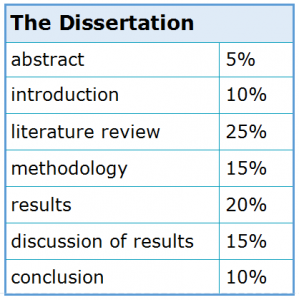
6. The Thesis
Finally, the thesis is the longest academic essay type and the one that’s reserved for doctorate students studying PhDs. Generally between 40,000 and 60,000 words in length, the doctorate thesis may contain all the elements of a dissertation but in much more detail and with more careful investigation. Such essays are almost certainly original and are based on primary research , with a larger focus on the accuracy of the literature review , data collection and data analysis . Many students will never encounter this essay type.
Once you can recognise which essay length you’ve been assigned, the next question covered in Chapter 3 is about determining the type of essay you have to write. This is because each essay type will require particular styles, structures, foci and language.
To reference this reader:
Academic Marker (2022) Essays . Available at: https://academicmarker.com/academic-guidance/assignments/essays/ (Accessed: Date Month Year).
- Harvard Writing Center
- Leeds University Library
- Purdue Online Writing Lab
Downloadables
Once you’ve completed all three chapters about essays , you might also wish to download our beginner, intermediate and advanced worksheets to test your progress or print for your students. These professional PDF worksheets can be easily accessed for only a few Academic Marks .
Our essays academic reader (including all four chapters about this topic) can be accessed here at the click of a button.
Gain unlimited access to our essays beginner worksheet, with activities and answer keys designed to check a basic understanding of this reader’s chapters.
To check a confident understanding of this reader’s chapters, click on the button below to download our essays intermediate worksheet with activities and answer keys.
Our essays advanced worksheet with activities and answer keys has been created to check a sophisticated understanding of this reader’s chapters.
To save yourself 5 Marks , click on the button below to gain unlimited access to all of our essays chapters and worksheets. The All-in-1 Pack includes every chapter in this reader, as well as our beginner, intermediate and advanced worksheets in one handy PDF.
Click on the button below to gain unlimited access to our essays teacher’s PowerPoint, which should include everything you’d need to successfully introduce this topic.
Collect Academic Marks
- 100 Marks for joining
- 25 Marks for daily e-learning
- 100-200 for feedback/testimonials
- 100-500 for referring your colleages/friends
- Directories
The length of introductions vary depending on your disciplinary area and the nature of your project so before writing one, it may be wise to discuss length and expectations of content with your supervisor. It is also worth taking a look at a range of past theses in your area to see what is expected in your field.
The introduction to the whole thesis can make up roughly 10 per cent of the total word count. So if you are doing a PhD of 80,000 - 100,000 words, you may have a 8,000 - 10,000 word introduction. And if you are writing a Masters thesis of 15,000 - 20,000 words, your introduction could be 1,500 - 2,000 words long. Exegeses tend to be anywhere between seven to 12 pages in length (1.5 cm spacing) and include images and/or diagrams.
Theses that generally have longer introductions do so because they incorporate more substantial background information and/or an extended literature review section.
Theses that have shorter introductions, say eight to ten pages (1.5 spacing) or about 4000 words for a PhD, do so in order to give a broad overview of the research project which is typically followed by a longer background or literature review chapter.
Regardless of the type of project you are doing or thesis you are writing, the introduction to the thesis or exegesis should give a broad overview of the project, as discussed in the page on introductions.
Individual chapters should also have introductions. An introduction to a chapter that is 10,000 words long could be about two to three pages long, whereas in shorter theses the chapter introductions may only be a page or two, or even just a paragraph or two. The length varies depending on how much you need to establish for your reader to understand how the chapter contributes to your research and argument.
Timing>>
Introductions
Chapter introductions
- ANU Library Academic Skills
- +61 2 6125 2972

- How Long Is a PhD Thesis?
- Doing a PhD
It’s no secret that one of the most challenging aspects of a PhD degree is the volume of work that goes into writing your thesis . So this raises the question, exactly how long is a thesis?
Unfortunately, there’s no one size fits all answer to this question. However, from the analysis of over 100 PhD theses, the average thesis length is between 80,000 and 100,000 words. A further analysis of 1000 PhD thesis shows the average number of pages to be 204 . In reality, the actual word count for each PhD thesis will depend on the specific subject and the university it is being hosted by. This is because universities set their own word length requirements, with most found to be opting for around 100,000.
To find out more about how these word limits differ between universities, how the average word count from STEM thesis differ from non-STEM thesis and a more detailed breakdown from the analysis of over 1000 PhDs, carry on reading the below.
Word Count Differences Between Universities
For any PhD student writing a thesis, they will find that their document will be subject to a word limit set by their university. In nearly all cases, the limit only concerns the maximum number of words and doesn’t place any restrictions on the minimum word limit. The reason for this is that the student will be expected to write their thesis with the aim of clearly explaining their research, and so it is up to the student to determine what he deems appropriate.
Saying this, it is well accepted amongst PhD students and supervisors that the absence of a lower limit doesn’t suggest that a thesis can be ‘light’. Your thesis will focus on several years worth of original research and explore new ideas, theories or concepts. Besides this, your thesis will need to cover a wide range of topics such as your literature review, research methodology, results and conclusion. Therefore, your examiners will expect the length of your thesis to be proportional to convey all this information to a sufficient level.
Selecting a handful of universities at random, they state the following thesis word limits on their website:
- University of Edinburgh: 100,000
- University of Exeter: 100,000
- University of Leister: 80,000
- University of Bath: 80,000
- University of Warwick: 70,000
The above universities set upper word limits that apply across the board, however, some universities, such as the University of Birmingham and the University of Sheffield, set different word limits for different departments. For example, the University of Sheffield adopts these limits:
- Arts & Humanities: 75,000
- Medicine, Dentistry & Health: 75,000
- Science: 80,000
- Social Sciences: 75,000-100,000
Although there’s a range of limit, it’s safe to say that the majority fall within the 80,000 to 100,000 bracket.
Word Count Based on Data from past Theses
A poll of 149 postdocs.
In mid-2019, Dr Eva Lantsoght, a published author, academic blogger and Structural Engineering Professor, conducted a poll which asked postgraduate doctoral students to share the length of their final thesis. 149 PostDoc students responded to the survey, with the majority reporting a length falling within the ‘80,000 – 120,000 words’ bracket as seen below.
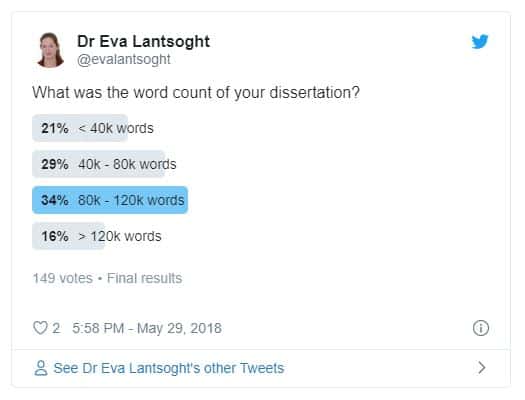
Analysis of 1000 PhD Theses
Over a three-year time period, Dr Ian Brailsford, a then Postgraduate Learning Adviser at the University of Auckland, analysed 1000 doctoral thesis submitted to his university’s library. The PhD theses which formed the basis of his analysis were produced between 2008 to 2017 and showed:
- Average number of pages = 204
- Median number of pages = 198
- Average number of chapters = 7.6
We should note that the above metrics only cover the content falling within the main body of the thesis. This includes the introduction, literature review, methods section, results chapter, discussions and conclusions. All other sections, such as the title page, abstract, table of contents, acknowledgements, bibliography and appendices were omitted from the count.
Although it’s impossible to draw the exact word count from the number of pages alone, by using the universities recommended format of 12pt Times New Roman and 1.5 lines spacing, and assuming 10% of the main body are figures and footnotes, this equates to an average main body of 52,000 words.
STEM vs Non-STEM
As part of Dr Ian Brailsford’s analysis, he also compared the length of STEM doctorate theses to non-STEM theses. He found that STEM theses tended to be shorter. In fact, he found STEM theses to have a medium page length of 159 whilst non-STEM theses had a medium of around 223 pages. This is a 40% increase in average length!
Can You Exceed the Word Count?
Whilst most universities will allow you to go over the word count if you need to, it comes with the caveat that you must have a very strong reason for needing to do so. Besides this, your supervisor will also need to support your request. This is to acknowledge that they have reviewed your situation and agree that exceeding the word limit will be absolutely necessary to avoid detriment unnecessary detriment to your work.
This means that whilst it is possible to submit a thesis over 100,000 words or more, it’s unlikely that your research project will need to.
How Does This Compare to a Masters Dissertation?
The average Masters dissertation length is approximately 20,000 words whilst a thesis is 4 to 5 times this length at approximately 80,000 – 100,000.
The key reason for this difference is because of the level of knowledge they convey. A Master’s dissertation focuses on concluding from existing knowledge whilst a PhD thesis focuses on drawing a conclusion from new knowledge. As a result, the thesis is significantly longer as the new knowledge needs to be well documented so it can be verified, disseminated and used to shape future research.
Finding a PhD has never been this easy – search for a PhD by keyword, location or academic area of interest.
Related Reading
Unfortunately, the completion of your thesis doesn’t mark the end of your degree just yet. Once you submit your thesis, it’s time to start preparing for your viva – the all-to-fun thesis defence interview! To help you prepare for this, we’ve produced a helpful guide which you can read here: The Complete Guide to PhD Vivas.
Browse PhDs Now
Join thousands of students.
Join thousands of other students and stay up to date with the latest PhD programmes, funding opportunities and advice.
- Have your assignments done by seasoned writers. 24/7
- Contact us:
- +1 (213) 221-0069
- [email protected]

How Long is a Thesis or Dissertation: College, Grad or PhD

How long is a thesis
As a graduate student, you may have heard that you must complete a certain comprehensive project, either a thesis or a dissertation. In this guide, we will explore how long a thesis should be, the best length for a dissertation, and the optimal length for each part of the two.
If you read on to the end, we will also explore their differences to understand how it informs each length.
Both terms have distinct meanings, although they are sometimes used interchangeably and frequently confused.

Structure-wise, both papers have an introduction, a literature review, a body, a conclusion, a bibliography, and an appendix. That aside, both papers have some differences, as we shall see later on in this article.
How Long Should a Thesis be
Before discussing how long a thesis is, it’s critical to understand what it is. A thesis is a paper that marks the end of a study program.
Mostly, there is the undergraduate thesis, a project that marks the end of a bachelor’s degree, and a master’s thesis that marks the end of a master’s program.
A thesis should be around 50 pages long for a bachelor’s degree and 60-100 pages for a Master’s degree. However, the optimal length of a thesis project depends on the faculty’s instructions and the supervising professor’s expectations . The length also depends on the topic’s technicalities and the extent of research done.

A master’s thesis project is longer because it is a compilation of all your knowledge obtained in your master’s degree.
It basically allows you to demonstrate your abilities in your chosen field.
Often, graduate schools require students pursuing research-oriented degrees to write a thesis.
This is to demonstrate their practical skills before completing their degrees.
In contrast to undergraduate thesis, which are shorter in length and coverage area, usually less than 60 pages. A master’s theses are lengthy scholarly work allowing you to research a topic deeply.
Then you are required to write, expand the topic, and demonstrate what you have learned throughout the program. This is part of why you must write a thesis for some undergrad in some of the courses.
A Master’s thesis necessitates a large amount of research, which may include conducting interviews, surveys, and gathering information ( both primary and secondary) depending on the subject and field of study.
For this reason, the master’s thesis has between 60 and 100 pages, without including the bibliography. Mostly, the topic and research approach determine the length of the paper.
This means that there is no definite number of pages required. However, your thesis should be long enough to clearly and concisely present all important information.
Need Help with your Homework or Essays?
How long should a dissertation be.
A dissertation is a complex, in-depth research paper usually written by Ph.D. students. When writing the dissertation, Ph.D. Students are required to create their research, formulate a hypothesis, and conduct the study.
On average, a dissertation should be at least 90 pages at the minimum and 200 pages at the maximum , depending on the guidelines of the faculty and the professor. The optimal length for a dissertation also depends on the depth of the research done, the components of the file, and the level of study.

Most Ph.D. dissertations papers are between 120 to 200 pages on average.
However, as we said earlier, it all depends on factors like the field of study, and methods of data collection, among others.
Unlike a master’s thesis, which is about 100 pages, a dissertation is at least twice this length.
This is because you must develop a completely new concept, study it, research it, and defend it.
In your Ph.D. program, a dissertation allows you the opportunity to bring new knowledge, theories, or practices to your field of study.
The Lengths of Each Part of a Thesis and Dissertation
Factors determining the length of thesis or dissertation.
As we have seen, there is no definite length of a thesis and dissertation. Most of these two important academic documents average 100 to 400 pages. However, several factors determine their length.

Universities- we all know universities are independent bodies. Also, it’s important to know that each university is different from the other. As a result, the thesis and dissertation length varies depending on the set rules in a certain college or school.
Field of study- some fields of study have rich information, while others have limited information.
For example, you may have much to write about or discover when it comes to science compared to history.
As such, if you are to write a thesis or a dissertation in both fields, one will definitely be longer than the other. Check the time it takes to write a thesis or a dissertation to get more points.
Other factors that affect the length of a thesis or a dissertation include your writing style and the instructor’s specifications. These factors also come into play when it comes to the time taken to defend a thesis or your dissertation.
Tips for the Optimal Length for a Thesis or Dissertation
Instead of writing for length, write for brevity. The goal is to write the smallest feasible document with all of the material needed to describe the study and back up the interpretation. Ensure to avoid irrelevant tangents and excessive repetitions at all costs.
The only repetition required is the main theme. The working hypothesis seeks to be elaborated and proved in your paper.
The theme is developed in the introduction, expanded in the body, and mentioned in the abstract and conclusion.
Here are some tips for writing the right length of thesis and dissertation:
- Remove any interpretation portion which is only tangentially linked to your new findings.
- Use tables to keep track of information that is repeated.
- Include enough background information for the reader to understand the point of view.
- Make good use of figure captions.
- Let the table stand on its own. I.e., do not describe the contents of the figures and/or tables one by one in the text. Instead, highlight the most important patterns, objects, or trends in the figures and tables in the text.
- Leave out any observations or results in the text that you haven’t provided data.
- Do not include conclusions that aren’t backed up by your findings.
- Remove all inconclusive interpretation and discussion portions.
- Avoid unnecessary adjectives, prepositional phrases, and adverbs.
- Make your sentences shorter – avoid nesting clauses or phrases.
- Avoid idioms and instead use words whose meaning can be looked up in a dictionary.
We can Write your Papers! No Plagiarism
Get that A on your next essay assignment without the hassles. Any topic or subject. 100% Plagiarism-Free Essays.
Difference between a Thesis and a Dissertation
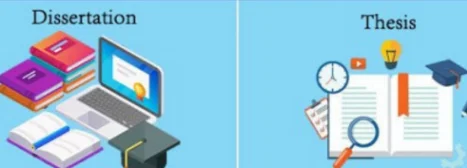
The most basic distinction between a thesis and a dissertation is when they are written.
While a thesis is a project completed after a master’s program, a dissertation is completed at the end of doctorate studies.
In a thesis, you present the results of your research to demonstrate that you have a thorough understanding of what you have studied during your master’s program.
On the other hand, a dissertation is your chance to add new knowledge, theories, or practices to your field while pursuing a doctorate. The goal here is to come up with a completely new concept, develop it, and defend it.
A master’s thesis is similar to the types of research papers you’re used to writing in your bachelor’s studies. It involves conducting research on a topic, analyzing it, and then commenting on your findings and how it applies to your research topic.
The thesis aims to demonstrate your capacity to think critically about and explain a topic in depth.
Furthermore, with a thesis, you typically use this time to elaborate on a topic that is most relevant to your professional area of specialization that you intend to pursue.
In a dissertation, on the other hand, you use other people’s research as an inspiration to help you come up with and prove your own hypothesis, idea, or concept. The majority of the data in a dissertation is credited to you.
Last but not least, these two major works differ greatly in length. The average length of a master’s thesis is at least 100 pages.
On the other hand, a doctoral dissertation should be substantially longer because it includes a lot of history and research information, as well as every element of your research, while explaining how you arrived at the information.
It is a complex piece of scholarly work, and it is likely to be twice or thrice the length of a thesis. To know the difference, check the best length for a thesis paper and see more about it.
Here is a Recap of the Differences
- While the thesis is completed at the end of your master’s degree program, a dissertation is written at the end of your doctoral degree program.
- Both documents also vary in length. A thesis should have at least 100 pages, while a doctoral dissertation is longer (over 200 pages)
- In the thesis, you conduct original research; in the dissertation, you use existing research to help you develop your discovery.
- For a thesis, you have to add analysis to the existing work, while a dissertation is part of the analysis of the existing work.
- In comparison to a thesis, a dissertation requires a more thorough study to expand your research in a certain topic.
- The statements in a thesis and a dissertation are distinct. While a thesis statement explains to readers how you will prove an argument in your research, a dissertation hypothesis defines and clarifies the outcomes you expect from your study. Here, you apply a theory to explore a certain topic.
- A dissertation allows you to contribute new knowledge to your field of study, while a thesis makes sure you understand what you have studied in your program and how it applies.
A thesis or a dissertation is a difficult document to compile. However, you should not be worried since your school assigns you a dissertation advisor who is a faculty member.
These advisors or supervisors help you find resources and ensure that your proposal is on the right track when you get stuck.
Check out my guide on the differences between a research paper, proposal, and thesis to understand more about these issues.

Josh Jasen or JJ as we fondly call him, is a senior academic editor at Grade Bees in charge of the writing department. When not managing complex essays and academic writing tasks, Josh is busy advising students on how to pass assignments. In his spare time, he loves playing football or walking with his dog around the park.
Related posts

caught buying dissertations
Avoid being Caught Buying Dissertations: Tips to Do it Right

Do Dissertation writing services work
Do Dissertation Writing services work? Is hiring someone Legal
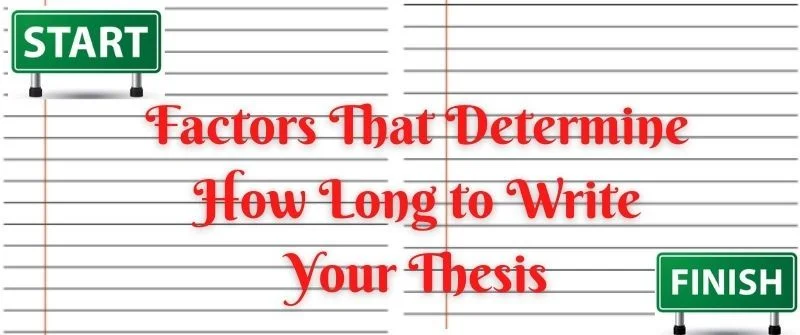
Time needed to write your thesis
Time to Write a Thesis or Dissertation: Tips to Finish Fast

IMAGES
VIDEO
COMMENTS
Step 1: Start with a question. You should come up with an initial thesis, sometimes called a working thesis, early in the writing process. As soon as you've decided on your essay topic, you need to work out what you want to say about it—a clear thesis will give your essay direction and structure.
⛺ What is the usual length of a thesis statement? In general, a thesis statement should have one or two sentences. But the length really depends on the overall length of your project. ... Every good essay should include a thesis statement as part of its introduction, no matter the academic level. Of course, if you are a high school student ...
Revised on April 16, 2024. A thesis is a type of research paper based on your original research. It is usually submitted as the final step of a master's program or a capstone to a bachelor's degree. Writing a thesis can be a daunting experience. Other than a dissertation, it is one of the longest pieces of writing students typically complete.
Here are some basic rules for thesis statement lengths based on the number of pages: 5 pages: 1 sentence. 5-8 pages: 1 or 2 sentences. 8-13 pages: 2 or 3 sentences. 13-23 pages: 3 or 4 sentences. Over 23 pages: a few sentences or a paragraph.
Essay length guidelines. Type of essay. Average word count range. Essay content. High school essay. 300-1000 words. In high school you are often asked to write a 5-paragraph essay, composed of an introduction, three body paragraphs, and a conclusion. College admission essay. 200-650 words.
Ideally, a thesis statement should be complex enough to explore over the length of the entire paper. Better: The most effective treatment plan for methamphetamine addiction may be a combination of pharmacological and cognitive therapy, as argued by Baker (2008), Smith (2009), and Xavier (2011).
A good thesis has two parts. It should tell what you plan to argue, and it should "telegraph" how you plan to argue—that is, what particular support for your claim is going where in your essay. Steps in Constructing a Thesis. First, analyze your primary sources. Look for tension, interest, ambiguity, controversy, and/or complication.
A thesis statement is a one-sentence declaration of intention — a summation of the main idea your essay will explain at length. An effective thesis statement will make a unique claim or seek to answer an important question. Tips for Writing a Good Thesis Statement ... When writing your essay's thesis statement, ask whether it is a statement ...
This persuasive type of thesis can be used in any essay that contains the writer's opinion, including, as I mentioned above, compare/contrast essays, narrative essays, and so on. 2 Styles of Thesis Statements. ... Length: A thesis statement can be short or long, depending on how many points it mentions. Typically, however, it is only one ...
Here is a general rule of thumb for determining the length of a thesis statement lengths based on the number of pages in the paper: 5 pages: 1 sentence. 5-8 pages: 1 or 2 sentences. ... The thesis statement of a high school essay should typically be one or two sentences long, comprising around 20 to 30 words in total. ...
A thesis typically ranges between 40-80 pages, but its length can vary based on the research topic, institution guidelines, and level of study. 2: How long is a PhD thesis? A PhD thesis usually spans 200-300 pages, though this can vary based on the discipline, complexity of the research, and institutional requirements.
What your thesis statement includes is determined by three things: 1. The subject and topic of the essay. 2. The purpose of the essay. 3. The length of the essay. Let's examine each of those in more detail to see how they can help us refine our thesis statement.
Tips for Writing Your Thesis Statement. 1. Determine what kind of paper you are writing: An analytical paper breaks down an issue or an idea into its component parts, evaluates the issue or idea, and presents this breakdown and evaluation to the audience.; An expository (explanatory) paper explains something to the audience.; An argumentative paper makes a claim about a topic and justifies ...
The length of your thesis statement should be commensurate with the depth of your research and the academic rigor of your program. For instance, a master's thesis may require a more nuanced thesis statement that addresses multiple facets of the research question, while a doctoral dissertation could demand an even more comprehensive and ...
6. The Thesis. Finally, the thesis is the longest academic essay type and the one that's reserved for doctorate students studying PhDs. Generally between 40,000 and 60,000 words in length, the doctorate thesis may contain all the elements of a dissertation but in much more detail and with more careful investigation.
Revised on June 1, 2023. Most college application portals specify a word count range for your essay, and you should stay within 10% of the upper limit. If no word count is specified, we advise keeping your essay between 400 and 600 words. You should aim to stay under the specified limit to show you can follow directions and write concisely.
And if you are writing a Masters thesis of 15,000 - 20,000 words, your introduction could be 1,500 - 2,000 words long. Exegeses tend to be anywhere between seven to 12 pages in length (1.5 cm spacing) and include images and/or diagrams. Theses that generally have longer introductions do so because they incorporate more substantial background ...
Unfortunately, there's no one size fits all answer to this question. However, from the analysis of over 100 PhD theses, the average thesis length is between 80,000 and 100,000 words. A further analysis of 1000 PhD thesis shows the average number of pages to be 204. In reality, the actual word count for each PhD thesis will depend on the ...
The length limit of an essay can also vary based on the instructor's preferences. A typical essay has approximately 3 to 5 paragraphs, translating to 400 to 700 words. College-level essay papers tend to be longer, requiring a limit of 500 to 2,000 words or 2 to 4 pages. On the other hand, academic essays, including research papers, literature ...
Argumentative essays. An argumentative essay presents an extended, evidence-based argument. It requires a strong thesis statement—a clearly defined stance on your topic. Your aim is to convince the reader of your thesis using evidence (such as quotations) and analysis.. Argumentative essays test your ability to research and present your own position on a topic.
A thesis should be around 50 pages long for a bachelor's degree and 60-100 pages for a Master's degree. However, the optimal length of a thesis project depends on the instructions from the faculty and the expectations of the supervising professor. The length also depends on the topic's technicalities and the extent of research done.